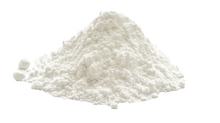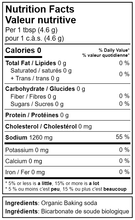Organic baking soda, also known as sodium bicarbonate, is a natural, multi-purpose compound that’s commonly used in baking, cleaning, and personal care products. It’s essentially the same as conventional baking soda, but the key difference is that it’s made from mineral deposits that have been processed without the use of synthetic chemicals, and it’s certified organic, meaning it's sourced and produced using eco-friendly and sustainable methods.
Here’s a breakdown of organic baking soda and its uses:
1. Production Process
-
Natural Sourcing: Organic baking soda is typically derived from trona ore or sodium carbonate minerals that are found in natural deposits. These minerals undergo a purification process to create the final product.
-
Eco-Friendly Production: The “organic” label refers to the way the baking soda is sourced and processed. Organic baking soda is produced without the use of synthetic fertilizers, pesticides, or GMOs, and it’s often mined using environmentally conscious methods.
2. Common Uses of Organic Baking Soda
-
Baking: Just like regular baking soda, organic baking soda is a leavening agent used in baking. It reacts with acidic ingredients (like vinegar or lemon juice) to produce carbon dioxide, which helps baked goods rise.
-
Recipes: Organic baking soda is used in cookies, cakes, muffins, and pancakes, as it helps create light, fluffy textures.
-
-
Cleaning: Organic baking soda can be used as a natural cleaner for various household surfaces. It’s a non-toxic alternative to harsh chemical cleaners and can help with:
-
Deodorizing: Sprinkle on carpets, in shoes, or in trash cans to neutralize odors.
-
Surface Scrubbing: Use it to scrub sinks, counters, tubs, and stovetops.
-
Cleaning Appliances: Use it to clean the inside of your fridge, microwave, or oven.
-
-
Personal Care:
-
Toothpaste: Organic baking soda is often found in natural toothpastes due to its ability to gently scrub teeth, neutralize acids in the mouth, and reduce plaque buildup.
-
Deodorant: It’s also used in homemade deodorants to absorb moisture and neutralize body odor.
-
Exfoliant: You can use it as a gentle exfoliant for your skin, helping to remove dead skin cells and leaving the skin feeling smooth.
-
-
Deodorizing the Refrigerator: Placing an open box of organic baking soda in your fridge helps absorb odors naturally.
3. Health and Safety Benefits
-
Non-Toxic and Safe: One of the key benefits of using organic baking soda is that it’s completely non-toxic and safe for the environment, pets, and children. This makes it a great alternative to chemicals in cleaning or personal care products.
-
Gentle on Skin: When used in personal care products or as an exfoliant, organic baking soda is mild and won’t irritate most skin types. However, it's best to test a small patch first, especially if you have sensitive skin.
4. Advantages of Organic Over Conventional Baking Soda
-
No Synthetic Chemicals: Organic baking soda is made from naturally occurring minerals and processed without the use of synthetic chemicals, which some people prefer for health and environmental reasons.
-
Sustainability: The organic farming practices that often underpin the production of organic baking soda tend to be more sustainable and environmentally friendly.
-
Fewer Additives: Some commercial baking sodas may contain additional chemicals or anti-caking agents to improve shelf life or performance. Organic versions are usually free from these additives.
5. Storage and Shelf Life
-
Organic baking soda doesn’t have an indefinite shelf life, but it can last for quite a while if stored properly. To preserve its potency, store it in an airtight container in a cool, dry place. Exposure to moisture or air can reduce its effectiveness as a leavening agent.
-
While baking soda doesn’t spoil, it can lose its effectiveness over time, especially after 6 months to a year. To test if it’s still good for baking, add a little vinegar to a teaspoon of baking soda—if it bubbles, it’s still active!
6. Other Benefits of Organic Baking Soda
-
Odor Neutralizer: Its ability to neutralize odors is one of the reasons it’s often used in refrigerators, shoes, and even laundry.
-
Natural Pest Control: Some people use baking soda as a natural insect repellent for plants and gardens. It's also sometimes sprinkled on carpets to help with pest control.
7. Environmental Impact
-
Organic baking soda tends to be more eco-friendly than conventional baking soda because it’s produced using sustainable, chemical-free methods. Plus, it can help reduce your overall reliance on harsh chemicals in cleaning and personal care products, contributing to a cleaner environment.
8. Where to Buy Organic Baking Soda
-
Organic baking soda is available in health food stores, natural product retailers, and many online shops. It's often found alongside other organic pantry staples or in the natural cleaning aisle.
9. Alternative Uses
-
Carpet Cleaning: Sprinkle on carpets, let it sit for a while, then vacuum it up to freshen and deodorize.
-
Laundry: Add a little baking soda to your laundry detergent to boost cleaning power and help neutralize odors.
In conclusion, organic baking soda is a natural, versatile product that can be used in many areas of daily life, from baking and cleaning to personal care. Its versatility, eco-friendliness, and non-toxic nature make it an excellent alternative to synthetic chemicals.




